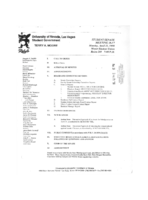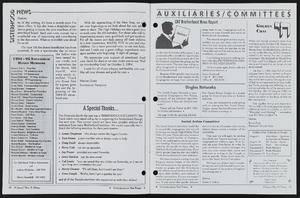Search the Special Collections and Archives Portal
Search Results

Transcript of interview with Harry Sax by Barbara Tabach, April 8, 2015
Date
Archival Collection
Description
Interview with Harry Sax by Barbara Tabach on April 8, 2015. In this interview, Sax discusses his family history and upbringing in Chicago, and his military service in Munich. He returned to Chicago and became business partners with Michael Schulson, with whom he opened several Arby's outposts, and expanded to Las Vegas in 1968. He talks about life in Las Vegas in the 1970s and the competition in the fast food industry. He then talks about the reform congregation in Chicago and his connection to Judaism throughout his life. He describes himself as a "closet Jew" before becoming president at Congregation Ner Tamid in 2007. Sax discusses the programs at Ner Tamid for all ages, and his continued involvement in the community.
In 1939, Harry Sax was born in Chicago, Illinois, the son to first generation American Jews. He spent his childhood on Chicago's South, where his family belonged to a progressive Reform congregation. After graduating from Hyde Park High School, he continued his education at Indiana University. In college, Harry was a member of the ZBT Jewish fraternity, participated in a singing group, and was a cadet in the Reserve Officers' Training Corps. Upon graduating from college, Harry was stationed in Munich, Germany as a second lieutenant in the Quartermasters Corps. In addition to his required military duties, he also participated in an after-hours acting group; through this group, he was hired as an extra and for small roles, including The Great Escape. When he finished his service, Harry returned to Chicago, where he connected with a high school friend, Mike Schulson. The two became partners and purchased Arby's franchises in Chicago and Las Vegas. Thus, in 1968, while his partner remained in Chicago, Harry moved to Las Vegas and opened two franchise locations in two weeks. Though it took a few years to stabilize the business and overcome competition, he opened a third location in 1972 on South Decatur, what was then the western edge of the city. Today, Harry has nineteen locations in Las Vegas, with additional franchises in Reno and Barstow, California, and employs nearly 300 people. After about twenty years as a "closet Jew" in the city, Harry reconnected with Judaism and joined Congregation Ner Tamid in the late 1990s. He served on its board, eventually becoming vice president and then president (2007-09). He also dedicated himself to have a bar mitzvah, following up on his Jewish education and confirmation as a teenager. Harry has also served on the Anti-Defamation League's board as well as an active member of the Chamber of Commerce.
Text

Interview with Cornelius John Smits, July 26, 2005
Date
Archival Collection
Description
Text

Interview with Lilias Gordon, May 14, 2004
Date
Archival Collection
Description
Text

Interview with Roger William Anderson, September 20, 2005
Date
Archival Collection
Description
Text

Interview with Gay (Gertrud Anne Yoder) Kauffman, October 11, 2006
Date
Archival Collection
Description
Access note: Audio temporarily sealed
Text

Interview with Ernest Benjamin Williams, March 26, 2004
Date
Archival Collection
Description
Text

Interview with Anna (Anne) Welsh, June 23, 2004
Date
Archival Collection
Description
Text

Meeting minutes for Consolidated Student Senate University of Nevada, Las Vegas, April 13, 1998
Date
Archival Collection
Description
Text

